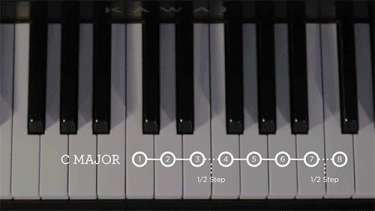How is it that Beethoven, who is celebrated as one of the most significant composers of all time, wrote many of his most beloved songs while going deaf? The answer lies in the math behind his music. Using the “Moonlight Sonataâ€, we can begin to understand the way Beethoven was able to convey emotion and creativity using the certainty of mathematics.
The standard piano octave consists of 13 keys, each separated by a half step. A standard major or minor scale uses 8 of these keys with 5 whole step intervals and 2 half step ones.
The first half of measure 50 of “Moonlight Sonata†consists of three notes in D major, separated by intervals called thirds that skip over the next note in the scale. By stacking the notes first, third, and fifth notes – D, F sharp, and A – we get a harmonic pattern known as a triad.
But, these aren’t just arbitrary magic numbers. Rather, they represent the mathematical relationship between the pitch frequencies of different notes, which form a geometric series. The stacking of these three frequencies creates ‘consonance’, which sounds naturally pleasant to our ears. Examining Beethoven’s use of both consonance and dissonance can help us begin to understand how he added the unquantifiable elements of emotion and creativity to the certainty of mathematics.
For a deeper dive into the mathematics of the “Moonlight Sonataâ€, watch the TED-Ed Lesson Music and math: The genius of Beethoven – Natalya St. Clair
Animation by Qa’ed Mai
Via Ratak Monodosico.








Jewel
When I taught piano to exceptionally bright boys, mati was always the bridge I used to make them understand music. Instead of random notes, they began to see the elegant strains of math weaving in and out of the music. It was always the Aha! moment. I hope you continue this theme with Bach’s mathematical genius and post the Mobius strip. Even better…find out about Wagner’s Tristan Chord.
Please Leave a Comment!